Kennedy’s Courage: A Toddler’s Triumph Over a Rare Brain Tumor
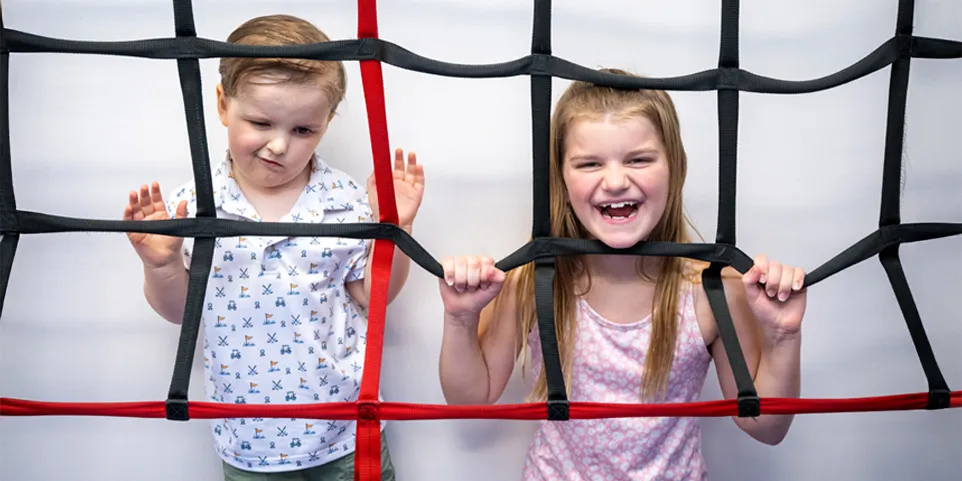

Topics
When Christina and Nate welcomed their second child, Kennedy, into the world, they had no idea how soon life would change. At just 9 months old, Kennedy was diagnosed with atypical teratoid rhabdoid tumor (ATRT), a rare, aggressive brain cancer primarily affecting very young children.
In July 2021, Kennedy was diagnosed with torticollis, a condition where the neck twists to one side. In addition, Kennedy began vomiting sporadically. Because he had just started solid foods, it was thought that this symptom was the result of the types of food or formula he took. A few weeks later, his symptoms worsened — he became increasingly fussy and didn’t want to lie down. When his head circumference suddenly increased by 2 to 3 centimeters at his 9-month checkup, Christina knew something was wrong.
On August 3, she brought Kennedy to Texas Children’s Hospital. Later that day, their fears were confirmed: Kennedy had a tumor at the back of his brain.
Kennedy’s diagnosis came during COVID protocols, making an already terrifying time even more isolating. Daniel Curry, MD, pediatric neurosurgeon at Texas Children’s Hospital performed a complex 8-hour surgery to remove the tumor. His parents came to learn that the soft spot on his skull had helped relieve dangerous pressure, which Christina attributes to helping save his life.
While the surgery left Kennedy with facial paralysis on one side and sudden hearing loss, the doctors successfully removed most of the tumor, leaving only a tiny portion in his auditory canal.
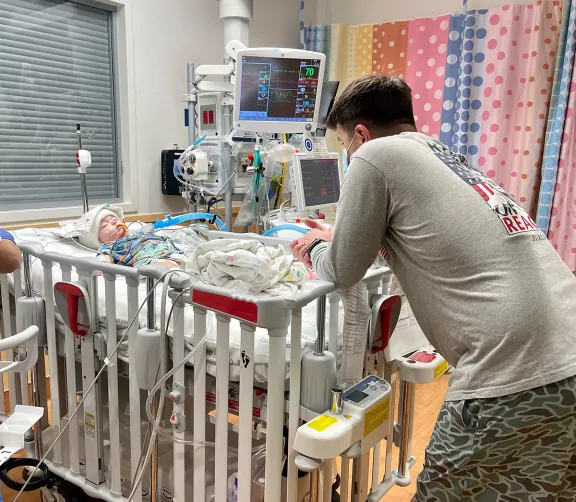
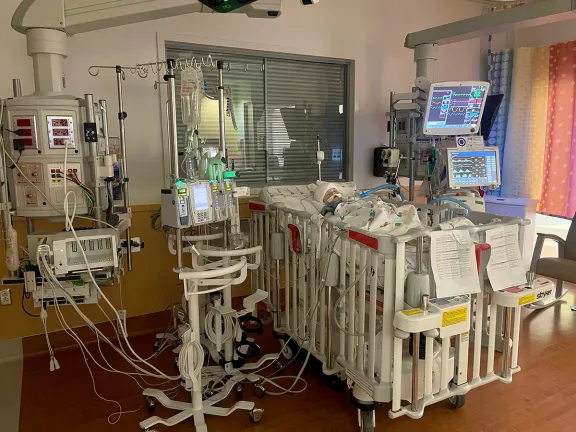
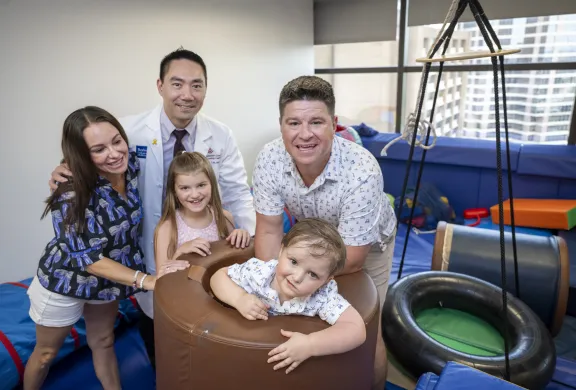
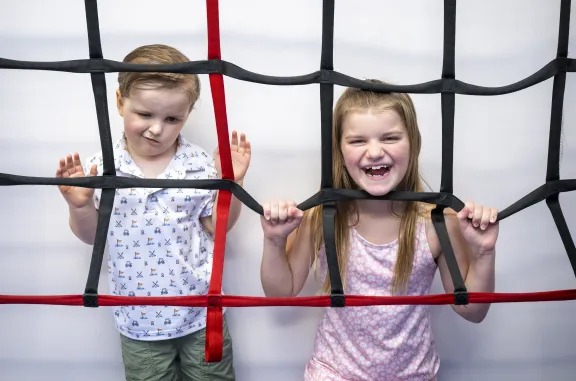
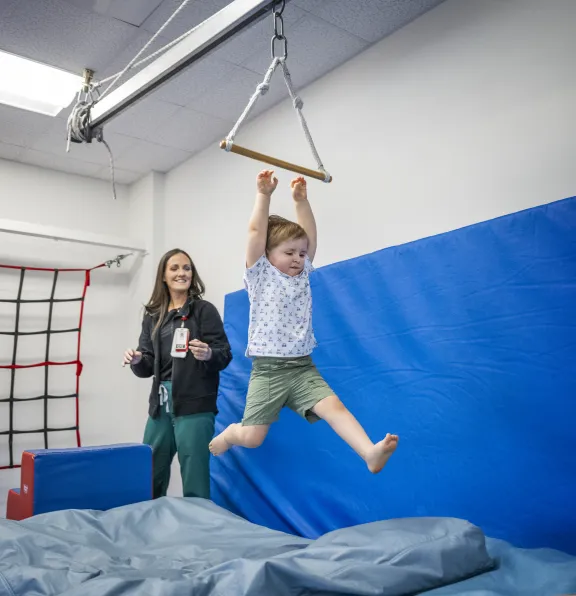
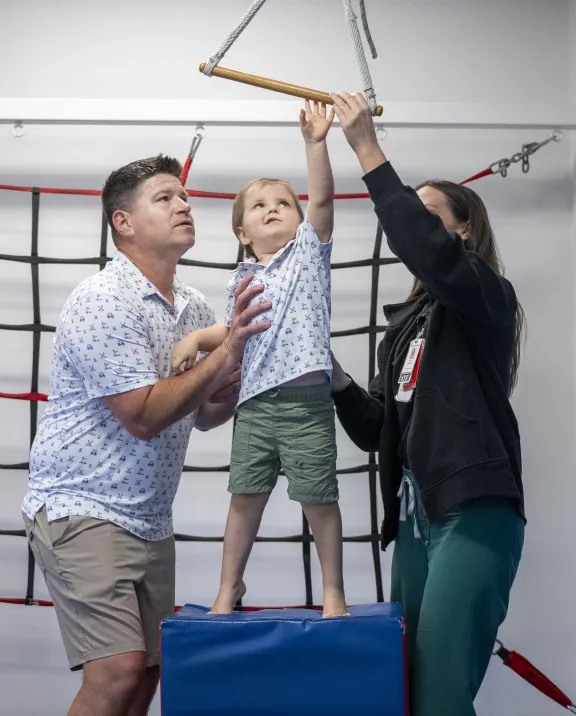
After surgery, Kennedy began intensive cancer treatment. He underwent three rounds of intense chemotherapy followed by three rounds of myeloablative chemotherapy requiring replacement with his own stem cells, and then a month and a half of proton beam radiation therapy.
Treatment was tough — not just on Kennedy, but also on his big sister Reagan and the rest of the family. Nate and Christina traded off 24-hour shifts in the hospital, while Reagan stayed with her grandparents, who had moved to Houston to help. The separation was difficult, but Reagan remained Kennedy’s biggest cheerleader, always ready with hugs and encouragement.
In total, Kennedy spent 10 months as an inpatient at Texas Children’s, learning to crawl and walk while in the hospital. He battled sepsis (a life-threatening blood infection) twice and endured multiple additional side effects of treatment. Even during the hardest days, his family found support in their care team, who became “like family” to them.
Kennedy completed chemotherapy in February 2022 and proton radiation in April 2022. Genetic testing confirmed the tumor wasn’t hereditary — it occurred due to a random DNA “glitch” that occurred during fetal development.
Today, Kennedy’s tumor remains dormant, and MRIs show no spread. He continues regular surveillance MRIs every 4 months.
“Each MRI lets us know we can live life for the next 4 months,” Christina said. “We’ve just celebrated 3 years off treatment.”
The family now cherishes everyday moments. They describe Kennedy as “an old man in a baby’s body” — funny, loving and wise beyond his years. Though he is exclusively tube-fed, Kennedy is thriving, with a golden retriever named Cooper providing emotional support and always by his side.
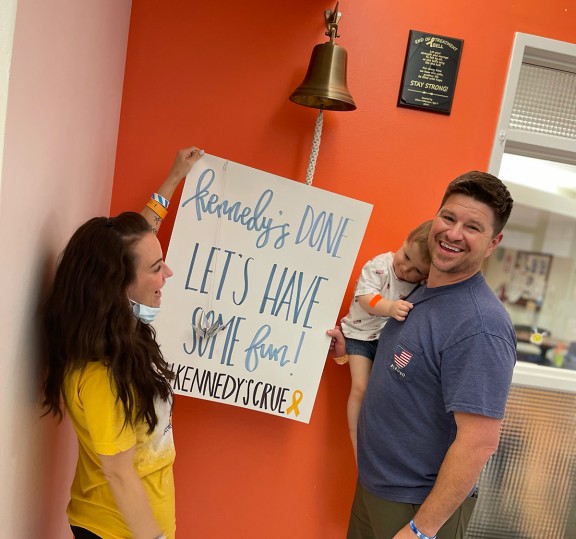
Kennedy’s medical journey isn’t over yet. He has upcoming reconstructive surgeries planned to help restore movement and symmetry to his face, which was affected by the tumor and treatment. These procedures will take place in multiple phases over the next year, with the goal of improving both function and appearance as he continues to grow.
In addition to surgery, Kennedy will remain under the care of multiple specialists at Texas Children’s—including those in audiology, ophthalmology, oncology, plastics and ENT surgery. These highly specialized team members will continue to work together to monitor his long-term recovery and overall health.
Christina and Nate want to encourage other parents facing childhood cancer: “Ask questions. Trust your care team. For us, they’re not just doctors and nurses — they’re friends helping our son survive. We’re all in this fight together.”
Texas Children’s Cancer and Hematology Center, affiliated with Baylor College of Medicine (BCM), is internationally recognized for excellence in clinical care, research and education. As one of the largest pediatric cancer centers in the United States, it consistently ranks among the nation's best.
Located in the world’s largest medical complex, the Center provides top-tier, individualized and family centered care to children and adolescents with cancer and blood disorders. With more than 200 faculty members, including 130 physicians, it welcomes over 3,000 new patients each year. The Center is part of Texas Children’s Hospital—one of the world’s largest pediatric hospitals and regularly ranked among the top 10 by U.S. News & World Report.
“By taking a multidisciplinary approach to care and closely collaborating across our various subspecialties — many of which are also ranked among the best — we are able to tackle the most rare and aggressive cancers and complex cases,” said Dr. Will Parsons, Interim Director of the Texas Children’s Cancer and Hematology Center and Professor of Pediatrics, Hematology-Oncology at Baylor College of Medicine. “Our team at Texas Children’s is incredibly honored to provide life-saving care to children like Kennedy.”
To learn more or support courageous families like Kennedy’s, visit Texas Children’s Cancer and Hematology Center.
